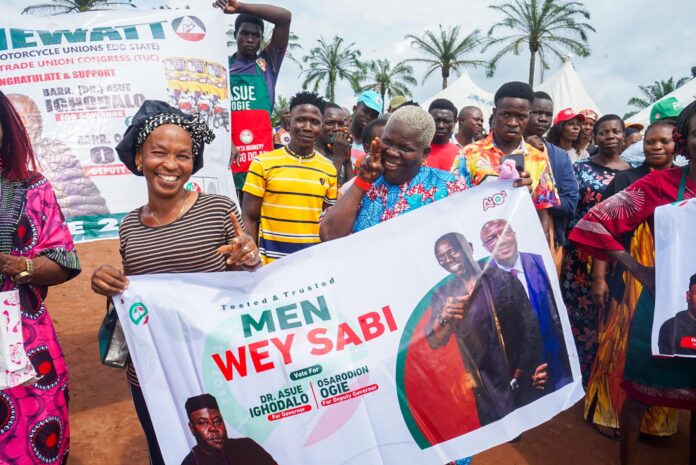The People’s Democratic Party (PDP) in Edo State may refuse to sign the Peace Accord scheduled for today. Governor Godwin Obaseki, the party’s leader in the state, has accused the police of acting in favor of the All Progressives Congress (APC) and waging war against the PDP.
Governor Obaseki voiced his concerns during a courtesy visit from Gen. Abdulsalam Abubakar, Chairman of the National Peace Committee (NPC), at the Government House in Benin City. The visit was intended to facilitate the signing of the Peace Accord ahead of the September 21 governorship election.
Obaseki criticised the police for what he describes as a clear bias against the PDP. He alleged that the police have arrested at least ten PDP leaders, including the Chairman of Esan West Local Government Area, Hon. Collins Aigbogun. According to Obaseki, these arrests were carried out without due process and with the apparent aim of undermining the PDP’s chances in the election.
The Governor expressed frustration over the handling of these arrests. “I reached out to the Edo State Commissioner of Police, requesting that due process be followed and the matter be handled locally. Unfortunately, this directive was ignored,” Obaseki said. He added that the arrested PDP members were taken to Abuja, which he views as an overreach.
Obaseki is demanding the immediate release of the detained PDP members and insists that if they have committed any offenses, they should be charged in Edo State. “Why should they be tried in Abuja if the offenses happened here in Edo State?” he questioned. His comments reflect growing concerns about the fairness of the electoral process.
Adding to the tension, Dr. Anthony Aziegbemi, the PDP Chairman in Edo State, has raised alarms over the appointment of officials linked to former Rivers State Governor, Nyesom Wike. Aziegbemi claims that these officials, who include the Edo State Resident Electoral Commissioner (REC) and the Commissioner of Police, are associates of Wike and have close ties with him.
“The REC, Anugbum Onuoha, and the Edo Commissioner of Police, CP Nemi Edwin-Iwo, are both linked to Wike,” Aziegbemi said. He expressed concerns that these appointments could compromise the neutrality of the electoral process.
The PDP’s concerns are not without precedent. Similar issues have arisen in previous elections, often involving allegations of bias and unfair practices. In the current climate, these accusations are exacerbated by a contentious political atmosphere and heightened scrutiny from both local and international observers.
Obaseki referenced his experience during the 2020 election, emphasising that the current situation is even more troubling. “Unlike 2020, I am very worried about the developments today,” he said. His comments underscore the high stakes of the upcoming election and the potential for significant political conflict.
The PDP’s decision on whether to sign the Peace Accord will depend on how these issues are addressed. The party has indicated that it may not sign the accord if it believes that the police and other officials are not impartial. This decision reflects the party’s broader strategy to challenge what it sees as systemic biases against it.
Gen. Abdulsalam Abubakar, representing the NPC, is tasked with ensuring a peaceful electoral process. His visit was aimed at facilitating dialogue and addressing concerns from all parties involved. However, the allegations of police bias and unfair treatment have complicated his efforts.
The involvement of Nyesom Wike and his associates in Edo State has been a contentious issue. Aziegbemi’s concerns about Wike’s influence reflect broader anxieties about how political affiliations and past experiences might affect the integrity of the election.
The accusations of bias and unfair treatment could have significant implications for the upcoming governorship election. If the PDP follows through on its threat to boycott the Peace Accord, it could lead to increased tension and potential violence.

